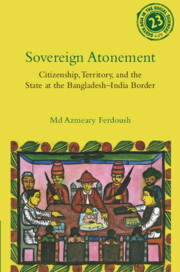Book contents
- Frontmatter
- Contents
- List of figures
- Preface
- Acknowledgments
- Introduction: Remnants, nations, and the sovereign
- 1 Sovereign atonement
- 2 From “sensitive” to “symbolic” spaces
- 3 Land and citizenship as technologies of territory
- 4 Everyday governance: Ambiguity, accountability, and abundance
- 5 Infrastructure, belonging, and the state
- 6 Refusal and tolerance
- Epilogue
- Appendix: A note on methods
- References
- Index
5 - Infrastructure, belonging, and the state
Published online by Cambridge University Press: 30 April 2024
- Frontmatter
- Contents
- List of figures
- Preface
- Acknowledgments
- Introduction: Remnants, nations, and the sovereign
- 1 Sovereign atonement
- 2 From “sensitive” to “symbolic” spaces
- 3 Land and citizenship as technologies of territory
- 4 Everyday governance: Ambiguity, accountability, and abundance
- 5 Infrastructure, belonging, and the state
- 6 Refusal and tolerance
- Epilogue
- Appendix: A note on methods
- References
- Index
Summary
It was the beginning of my fieldwork in Dasiar Chhara toward the end of 2017. I was supposed to meet my contact in Dasiar Chhara in the morning. He had told me to come to Rashmela Bazaar. As I was still unfamiliar with the routes to the enclave from Fulbari and unaware of the best means of transportation (which I later discovered was rented motorbikes), I rented a rickshaw. However, before renting the rickshaw, I wanted to make sure that the rickshaw puller knew how to get there. So I asked several of them, and no one had ever heard of the place. Then there was a smart one who said, “Oh! you want to go to the Ashermela Bazaar?” Immediately realizing my urban elitist mistake, I nodded. In northern Bangladeshi dialect, “r” is often replaced by “a,” and pronunciations are slightly distorted compared to standard Bangla. Rashmela Bazaar was therefore known locally as “Ashermela Bazaar.” However, the smart rickshaw puller proved too smart. He had deceived me when I hired him, as shortly after starting our ride, I realized he did not know how to get to Ashermela. He had a vague idea about which direction to head in. So, after a few minutes, he started asking random people on the road for directions. I was inevitably late in reaching my destination. When I finally arrived, my contact had already left as he had something else to take care of. But he asked me to wait at one of the tea stalls and promised he would be back soon. As I was sipping a steaming cup of tea sweetened with an inordinate amount of sugar and condensed milk, a tall skinny young guy approached me. He introduced himself as Rony and said he lived nearby. He asked me what I was doing there. A little cautious at first, I told Rony that I was a researcher and was waiting to meet my contact with whom I hoped to explore the former enclave and learn more about the people and their lives. Rony immediately got interested and moved himself closer to where I was sitting, ordering a cup of tea for himself too. We started the first of our many conversations that followed that morning.
- Type
- Chapter
- Information
- Sovereign AtonementCitizenship, Territory, and the State at the Bangladesh-India Border, pp. 111 - 141Publisher: Cambridge University PressPrint publication year: 2024



